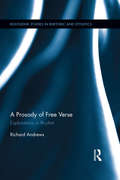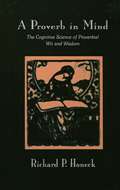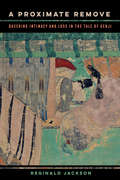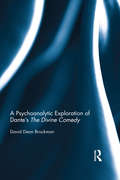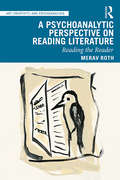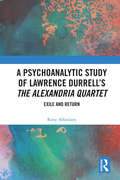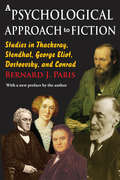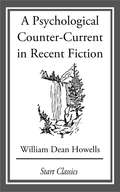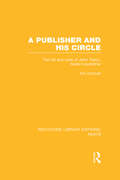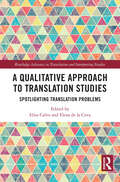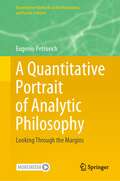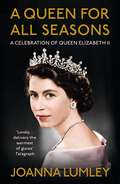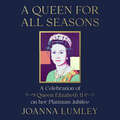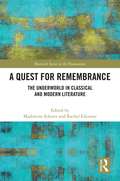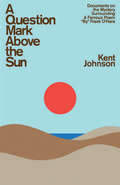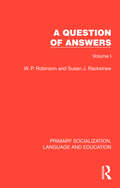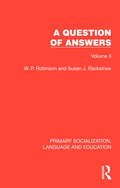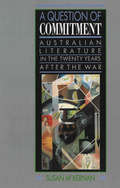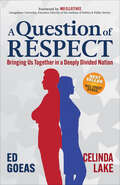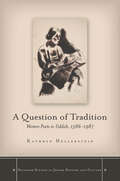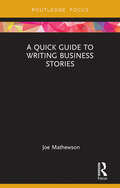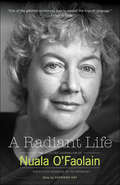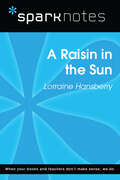- Table View
- List View
A Prosody of Free Verse: Explorations in Rhythm (Routledge Studies in Rhetoric and Stylistics)
by Richard AndrewsThere is to date no comprehensive account of the rhythms of free verse. The main purpose of A Prosody of Free Verse: explorations in rhythm is to fill that gap and begin to provide a systematic approach to describing and analyzing free verse rhythms. Most studies have declared the attempt to write such a prosody as impossible: they prefer to see free verse as an aberrant version of regular metrical verse. They also believe that behind free verse is the ‘ghost of metre’. Running against that current, A Prosody of Free Verse bases its new system on additive rhythms that do not fit conventional time signatures. Inspiration is taken from jazz, contemporary music and dance, not only in their systems of notation but in performance. The book argues that twentieth and twenty-first century rhythms in poetry as based on the line rather than the metrical foot as the unit of rhythm , and that larger rhythmic structures fall into verse paragraphs rather than stanzas.
A Proverb in Mind: The Cognitive Science of Proverbial Wit and Wisdom
by Richard P. HoneckSEE SHORT BLURB FOR ALTERNATE COPY... A complex, intriguing, and important verbal entity, the proverb has been the subject of a vast number of opinions, studies, and analyses. To accommodate the assorted possible audiences, this volume outlines seven views of the proverb -- personal, formal, religious, literary, practical, cultural, and cognitive. Because the author's goal is to provide a scientific understanding of proverb comprehension and production, he draws largely on scholarship stemming from the formal, cultural, and cognitive views. The only book about proverbs that is written from the standpoint of cognitive science, cognitive psychology, and experimentalism, this text provides a larger, more interdisciplinary perspective on the proverb. It also gives a theoretically more integrated approach to proverb cognition. The conceptual base theory of proverb comprehension is extended via the "cognitive ideals hypothesis" so that the theory now addresses issues regarding the creation, production, and pragmatics of proverbs. This hypothesis also has strong implications for a taxonomy of proverbs, proverb comprehension, universal vs. culture-specific aspects of proverbs, and some structural aspects of proverbs. In general, the book extends the challenge of proverb cognition by using much of what cognitive science has to offer. In so doing, the proverb is compared to other forms of figurative language, which is then discussed within the larger rubric of intelligence and the inclination for using indirect modes of communication. Child developmental and brain substrates are also discussed.
A Proximate Remove: Queering Intimacy and Loss in The Tale of Genji (New Interventions in Japanese Studies #2)
by Reginald JacksonA free ebook version of this title is available through Luminos, University of California Press's Open Access publishing program. Visit www.luminosoa.org to learn more. How might queer theory transform our interpretations of medieval Japanese literature and how might this literature reorient the assumptions, priorities, and critical practices of queer theory? Through a close reading of The Tale of Genji, an eleventh-century text that depicts the lifestyles of aristocrats during the Heian period, A Proximate Remove explores this question by mapping the destabilizing aesthetic, affective, and phenomenological dimensions of experiencing intimacy and loss. The spatiotemporal fissures Reginald Jackson calls "proximate removes" suspend belief in prevailing structures. Beyond issues of sexuality, Genji queers in its reluctance to romanticize or reproduce a flawed social order. An understanding of this hesitation enhances how we engage with premodern texts and how we question contemporary disciplinary stances.
A Psychoanalytic Exploration of Dante's The Divine Comedy
by David Dean BrockmanDavid Dean Brockman connects spirituality with psychoanalysis throughout this book as he looks at Dante’s early writings, his life story and his "polysemous" classical poem The Divine Comedy. Dante wanted to create a document that would educate the common man about his journey from brokenness to growth and a solid integration of body, self, and soul. This book draws the resemblance between Dante’s poem and the "journey" that patients experience in psychoanalytic therapy. It will be the first total treatment of Dante’s work in general, and The Divine Comedy in particular, using the psychoanalytic method. This fascinating study of Dante’s The Divine Comedy will be of interest to psychoanalysts, psychotherapists, and psychiatrists, as well as those still in training. Academics and students of psychology, spirituality, religion, and literature may also be interested in Brockman’s in-depth study of Dante’s work.
A Psychoanalytic Perspective on Reading Literature: Reading the Reader (Art, Creativity, and Psychoanalysis Book Series)
by Merav RothWhat are the unconscious processes involved in reading literature? How does literature influence our psychological development and existential challenges? A Psychoanalytic Perspective on Reading Literature offers a unique glimpse into the unconscious psychic processes and development involved in reading. The author listens to the 'free associations' of various literary characters, in numerous scenarios where the characters are themselves reading literature, thus revealing the mysterious ways in which reading literature helps us and contributes to our development. The book offers an introduction both to classic literature (Poe, Proust, Sartre, Semprún, Pessoa, Agnon and more) and to the major psychoanalytic concepts that can be used in reading it – all described and widely explained before being used as tools for interpreting the literary illustrations. The book thus offers a rich lexical psychoanalytic source, alongside its main aim in analysing the reader’s psychological mechanisms and development. Psychoanalytic interpretation of those literary readers opens three main avenues to the reader’s experience: the transference relations toward the literary characters; the literary work as means to transcend beyond the reader’s self-identity and existential boundaries; and mobilization of internal dialectic tensions towards new integration and psychic equilibrium. An Epilogue concludes by emphasising the transformational power embedded in reading literature. The fascinating dialogue between literature and psychoanalysis illuminates hitherto concealed aspects of each discipline and contributes to new insights in both fields. A Psychoanalytic Perspective on Reading Literature will be of great interest not only to psychoanalytic-psychotherapists and literature scholars, but also to a wider readership beyond these areas of study.
A Psychoanalytic Study of Lawrence Durrell’s The Alexandria Quartet: Exile and Return
by Rony AlfandaryA Psychoanalytic Study of Lawrence Durrell’s The Alexandria Quartet: Exile and Return focuses on the dialogue created by literature and psychoanalysis in an individual’s quest to explore existential issues, such as a sense of belonging to a homeland and a recurring sense of the Uncanny (das unheimliche). Rony Alfandary explores Durrell’s attempt to recreate a sense of belonging to a homeland, which perhaps never existed but can be retraced and reinvented through writing. This book studies some issues present in Durrell’s work: the connection between biographical and fictional elements in the study of literature the influence of early Freudian theoretical themes upon the writer later influences including post-modern and hermeneutic theories The life and work of Lawrence Durrell can serve as a prototype of a man’s quest for meaning, in a world caught in turmoil in the period between and during WW2. The author’s psychoanalytic exploration of the work and its relevance to human experience today, shows how the themes Durrell dealt with remain relevant. Alfandary highlights the ways in which his usage of several author narrative styles exemplifies the divergent and often contradictory nature of "Truth", emerging rather as multi-layered, multi-voiced and often torn sense of human subjectivity. A Psychoanalytic Study of Lawrence Durrell’s The Alexandria Quartet: Exile and Return demonstrates Durrell’s strong influence by psychoanalytic thought and will appeal to both psychoanalytic and literary scholars.
A Psychological Approach to Fiction: Studies in Thackeray, Stendhal, George Eliot, Dostoevsky, and Conrad
by Bernard J. Paris"Psychology helps us to talk about what the novelist knows, but fiction helps us to know what the psychologist is talking about." So writes the author of this brilliant study. The chief impulse of realistic fiction is mimetic; novels of psychological realism call by their very nature for psychological analysis. This study uses psychology to analyze important characters and to explore the consciousness of the author and the work as a whole. What is needed for the interpretation of realistic fiction is a psychological theory congruent with the experience portrayed. Emerging from Paris' approach are wholly new and illuminating interpretations of Becky Sharp, William Dobbin, Amelia Sedley, Julien Sorel, Madame de Renal, Mathilde de la Mole, Maggie Tulliver, the underground man, Charley Marlow, and Lord Jim. The psychological approach employed by Paris helps the reader not only to grasp the intricacies of mimetic characterization, but also to make sense of thematic inconsistencies which occur in some of the books under consideration. For students of human behavior as well as students of literature, the great figures of realistic fiction provide a rich source of empathic understanding and psychological insight.
A Psychological Counter-Current in Recent Fiction
by William Dean HowellsIt is consoling as often as dismaying to find in what seems a cataclysmal tide of a certain direction a strong drift to the opposite quarter. It is so divinable, if not so perceptible, that its presence may usually be recognized as a beginning of the turn in every tide which is sure, sooner or later, to come. In reform, it is the menace of reaction; in reaction, it is the promise of reform; we may take heart as we must lose heart from it. A few years ago, when a movement which carried fiction to the highest place in literature was apparently of such onward and upward sweep that there could be no return or descent, there was a counter-current in it which stayed it at last, and pulled it back to that lamentable level where fiction is now sunk, and the word "novel" is again the synonym of all that is morally false and mentally despicable.
A Publisher and his Circle: The Life and Work of John Taylor, Keats' Publisher (Routledge Library Editions: Keats)
by Tim ChilcottIn the early nineteenth century, the publishing house of Taylor & Hessey brought out the work of Keats, Clare, Hazlitt, De Quincey, Carlyle, Lamb, Coleridge and many more of the most important literary figures of the time, as well as the great literary journal of the period, the London Magazine. Tim Chilcott here examines the life and work of John Taylor, the firm’s founder. The account, originally published in 1972 and incorporating a large amount of hitherto unpublished material, is a fascinating piece of literary, social and publishing history, showing clearly the relationship between the author and his publisher, and in turn between the publisher and the reading public.
A Qualitative Approach to Translation Studies: Spotlighting Translation Problems (Routledge Advances in Translation and Interpreting Studies)
by Elisa Calvo and Elena de la CovaThis collection invites readers to explore innovative or underexploited ways of working qualitatively with what in Translation Studies may be termed as elusive constructs. The volume adopts a functionalist approach to focus on one such concept, namely the notion of translation problem, using case studies to illustrate how a significant elusive construct can be addressed empirically. It explores different qualitative research methodologies which, although well established in other fields, are yet to be extensively used in TS but which may nevertheless prove to be of significance for future studies as they allow elusive concepts typically found in TS to be worked with more coherently. Chapters are structured around two core ideas: first, the qualitative, systematic analysis of source text content with emphasis on the detection of translation problems as a means of creating efficient frameworks for coherent decision-making from a functional perspective; and secondly, the practical process of stereotyping and profiling specific problems within different contexts, content types or services to help identify, manage and resolve them in a number of settings, from research to professional translator training and assessment environments. This book will be of interest to scholars in translation studies, particularly those with an interest in qualitative approaches.
A Quantitative Portrait of Analytic Philosophy: Looking Through the Margins (Quantitative Methods in the Humanities and Social Sciences)
by Eugenio PetrovichThis book offers an unprecedented quantitative portrait of analytic philosophy focusing on two seemingly marginal features of philosophical texts: citations and acknowledgements in academic publications. Originating from a little network of philosophers based in Oxford, Cambridge, and Vienna, analytic philosophy has become during the Twentieth century a thriving philosophical community with thousands of members worldwide. Leveraging the most advanced techniques from bibliometrics, citations and acknowledgments are used in this book to shed light on both the epistemology and the sociology of this philosophical field, illuminating the intellectual trajectory of analytic philosophy as well as the social characteristics of the analytic community. Special attention is dedicated to the last forty years, providing insights into a phase of analytic philosophy which is still understudied by historians of philosophy. In the eight chapters of the book, readers will find not only numerous quantitative investigations and technical explanations, but also a robust theoretical framework and epistemological reflections on the strengths and limitations of quantitative methods for the study of philosophy. With its strong interdisciplinary appeal, this book will engage a wide range of scholars, including historians of philosophy seeking new methodologies, analytic philosophers interested in a new look at their discipline, and scholars in digital humanities, bibliometrics, and quantitative studies of science, who will find many innovative techniques for investigating disciplinary fields.
A Queen for All Seasons: A Celebration of Queen Elizabeth II on her Platinum Jubilee
by Joanna LumleyA sparkling celebration of our much-loved Queen Elizabeth II for her Platinum Jubilee including special writings and illuminating insights around key moments in her 70-year reign, introduced and edited by her biggest fan Joanna Lumley.In 2022 Queen Elizabeth II celebrates seventy years as Queen and Head of the Commonwealth. She is Britain's longest reigning monarch and the very first to celebrate a Platinum Jubilee. A Queen For All Seasons, edited and introduced by Joanna Lumley, is a perceptive, touching and engaging tribute to this unique woman. A treasure chest of first-hand writings, insights and snapshots of the Queen during key moments of her reign to form a vibrant portrait of the woman herself and the extraordinary role she plays. Joanna Lumley guides us as we meet Princess Elizabeth in 1952, aged just twenty-five, and about to become Queen, and brings us through to the present day when, as our matriarch, the Queen keeps the national ship steady, including in moments of crisis and suffering. Here are unique perspectives into some of the most fascinating aspects of the Queen's life - her role as head of state at home and abroad, her private passions and public interests and a bird's-eye look at key events that have held the nation together and the Queen in our affection throughout Britain and beyond.This book is a special and unique portrait of our constant Queen in an ever-changing world.
A Queen for All Seasons: A Celebration of Queen Elizabeth II on her Platinum Jubilee
by Joanna Lumley'Lovely... delivers the warmest of glows' - The TelegraphA sparkling celebration of our much-loved Queen Elizabeth II for her Platinum Jubilee including special writings and illuminating insights around key moments in her 70-year reign, introduced and edited by her biggest fan Joanna Lumley.In 2022 Queen Elizabeth II celebrates seventy years as Queen and Head of the Commonwealth. She is Britain's longest reigning monarch and the very first to celebrate a Platinum Jubilee. A Queen For All Seasons, edited and introduced by Joanna Lumley, is a perceptive, touching and engaging tribute to this unique woman. A treasure chest of first-hand writings, insights and snapshots of the Queen during key moments of her reign to form a vibrant portrait of the woman herself and the extraordinary role she plays. Joanna Lumley guides us as we meet Princess Elizabeth in 1952, aged just twenty-five, and about to become Queen, and brings us through to the present day when, as our matriarch, the Queen keeps the national ship steady, including in moments of crisis and suffering. Here are unique perspectives into some of the most fascinating aspects of the Queen's life - her role as head of state at home and abroad, her private passions and public interests and a bird's-eye look at key events that have held the nation together and the Queen in our affection throughout Britain and beyond.This book is a special and unique portrait of our constant Queen in an ever-changing world.
A Queen for All Seasons: A Celebration of Queen Elizabeth II on her Platinum Jubilee
by Joanna LumleyA sparkling celebration of our much-loved Queen Elizabeth II for her Platinum Jubilee including special writings and illuminating insights around key moments in her 70-year reign, introduced and edited by her biggest fan Joanna Lumley.In 2022 Queen Elizabeth II celebrates seventy years as Queen and Head of the Commonwealth. She is Britain's longest reigning monarch and the very first to celebrate a Platinum Jubilee. A Queen For All Seasons, edited and introduced by Joanna Lumley, is a perceptive, touching and engaging tribute to this unique woman. A treasure chest of first-hand writings, insights and snapshots of the Queen during key moments of her reign to form a vibrant portrait of the woman herself and the extraordinary role she plays. Joanna Lumley guides us as we meet Princess Elizabeth in 1952, aged just twenty-five, and about to become Queen, and brings us through to the present day when, as our matriarch, the Queen keeps the national ship steady, including in moments of crisis and suffering. Here are unique perspectives into some of the most fascinating aspects of the Queen's life - her role as head of state at home and abroad, her private passions and public interests and a bird's-eye look at key events that have held the nation together and the Queen in our affection throughout Britain and beyond.This book is a special and unique portrait of our constant Queen in an ever-changing world.(P)2021 Hodder & Stoughton Limited
A Quest for Remembrance: The Underworld in Classical and Modern Literature (Warwick Series in the Humanities)
by Rachel Falconer Madeleine SchererA Quest for Remembrance: The Underworld in Classical and Modern literature brings together a range of arguments exploring connections between the descent into the underworld, also known as katabasis, and various forms of memory. Its chapters investigate the uses of the descent topos both in antiquity and in the reception of classical literature in the nineteenth to twenty-first centuries. In the process, the volume explores how the hero’s quest into the underworld engages with the theme of recovering memories from the past. At the same time, we aim to foreground how the narrative format itself is concerned with forms of commemoration ranging from trans-cultural memory, remembering the literary and intellectual canon, to commemorating important historical events that might otherwise be forgotten. Through highlighting this duality this collection aims to introduce the descent narrative as its own literary genre, a ‘memorious genre’ related to but distinct from the quest narrative.
A Question Mark Above the Sun
by David Koepsell Eric Lorberer Kent Johnson"At the end of last year, an extraordinary work of detective criticism briefly appeared, despite legal threats. Kent Johnson's A Question Mark Above the Sun (Punch Press) movingly speculates that Kenneth Koch forged one of Frank O'Hara's greatest poems as a posthumous tribute to his friend. A noir-ish middle also recounts some very funny run-ins with the English avant-garde. Shame on the poets who forced its redaction and suppression." - Jeremy Noel-Tod, The Times Literary Supplement, including a previous edition of A Question Mark Above the Sun as one of its 2011 Books of the YearWhat you have in your hands is a kind of thought-experiment. It proffers the idea that a radical, secret gesture of poetic mourning and love was carried out by Kenneth Koch in memory of his close friend Frank O'Hara. I present the hypothesis as my own very personal expression of homage for the two great poets. The proposal I set forward here, nevertheless, is likely to make some readers annoyed, perhaps even indignant. Some already are. A few fellow writers, even, have worked hard through legal courses to block this book's publication. The forced redaction of key quotations herein (replaced by paraphrase) is one result of their efforts.In this self-described "thought experiment"-part fiction, part literary detective work, and always daring-Kent Johnson proposes a stunning rewrite of literary history. Suppressed upon initial release, this is a one-of-a-kind book by one of our most provocative contemporary authors.Kent Johnson is the author, translator, or editor of over thirty books of poetry and criticism, including Beneath a Single Moon: Buddhism in Contemporary American Poetry (Shambhala Publications, 1991), Doubled Flowering: From the Notebooks of Araki Yasusada (Roof Books, 1998), and his most recent collection of poems, Homage to the Last Avante-Garde (Shearsman Books, 2008). Best known for his radical ideas about authorship, scholarship, and experimentation, it was with his translations of Hiroshima survivor poet Araki Yasusada that Johnson became both celebrated and castigated. Only after Yasusada's poems were published in American Poetry Review did readers learn there was no Yasusada, and that Johnson was not a translator on this project, but the author. Johnson is the recipient of a National Endowment for the Arts Literature Fellowship in Translation. He lives in Illinois, where he is a faculty member in English and Spanish at Highland Community College.
A Question of Answers: Volume I (Primary Socialization, Language and Education)
by W. P. Robinson Susan J. RackstrawIn the early 1970s, the problem of arousing and maintaining the curiosity of children had been a recurrent theme in reports concerned with the development of new school curricula. However, before these ideas could be translated into soundly based practical measures, an increased understanding of what is involved in the activities of questioning and answering was needed.Originally published in 1972, the research reported in these two volumes presents a theoretical framework for describing linguistic features of a range of verbally expressed answers and their associated questions. Basil Bernstein’s theory is used to generate a number of predictions about the variety and quality of answers that mothers and children are likely to offer to ‘wh’ questions. The usefulness of the scheme is tested against the answering behaviour of members of different social classes, and, in the main, Bernstein’s predictions are supported. The validity of the categories in the classificatory scheme is explored more fully in later chapters by means of a correlational analysis of the answers of seven-year-old children.Volumes sold separately.
A Question of Answers: Volume II (Primary Socialization, Language and Education)
by W. P. Robinson Susan J. RackstrawIn the early 1970s, the problem of arousing and maintaining the curiosity of children had been a recurrent theme in reports concerned with the development of new school curricula. However, before these ideas could be translated into soundly based practical measures, an increased understanding of what is involved in the activities of questioning and answering was needed.Originally published in 1972, the research reported in these two volumes presents a theoretical framework for describing linguistic features of a range of verbally expressed answers and their associated questions. Basil Bernstein’s theory is used to generate a number of predictions about the variety and quality of answers that mothers and children are likely to offer to ‘wh’ questions. The usefulness of the scheme is tested against the answering behaviour of members of different social classes, and, in the main, Bernstein’s predictions are supported. The validity of the categories in the classificatory scheme is explored more fully in later chapters by means of a correlational analysis of the answers of seven-year-old children.Volumes sold separately.
A Question of Commitment: Australian literature in the twenty years after the war
by Susan LeverIn the years since the Second World War, Australia has seen a period of literary creativity which outshines any earlier period in the nation's literary history. This creativity has its beginnings in the arguments and alignments which emerged at the end of the War, and the changes in perceptions of art and society which occurred during the fifties and early sixties.A Question of Commitment examines the attitudes of writers as diverse as James McAuley, Frank Hardy, Judith Wright, Patrick White and A. D. Hope, as they responded to a changing Australian society during the postwar years. Through their work and that of many others, it considers the debates about literary nationalism, the artistic politics of the Cold War, the threat of technology to art in the Atomic Age, and the nature of the writer's role in the new society. It documents the way in which the political commitments of some writers and the resistance to commitment of others were challenged by political and social changes of the late fifties.Susan McKernan's lively exploration of Australia's writers in a time of innovation provides the reader with the context needed to understand the creative choices they made and, in so doing, introduces wider intellectual and cultural issues which remain relevant to this day.
A Question of RESPECT: Bringing Us Together in a Deeply Divided Nation
by Celinda Lake Ed GoeasA Question of Respect speaks to voters who are tired of a political environment that ends in immovable stalemate, grounded by a political party’s voter base without addressing solutions or attempting to understand the opposing side.
A Question of Tradition: Women Poets in Yiddish, 1586-1987
by Kathryn HellersteinIn A Question of Tradition, Kathryn Hellerstein explores the roles that women poets played in forming a modern Yiddish literary tradition. Women who wrote in Yiddish go largely unrecognized outside a rapidly diminishing Yiddish readership. Even in the heyday of Yiddish literature, they were regarded as marginal. But for over four centuries, women wrote and published Yiddish poems that addressed the crises of Jewish history#151;from the plague to the Holocaust#151;as well as the challenges and pleasures of daily life: prayer, art, friendship, nature, family, and love. Through close readings and translations of poems of eighteen writers, Hellerstein argues for a new perspective on a tradition of women Yiddish poets. Framed by a consideration of Ezra Korman's 1928 anthology of women poets, Hellerstein develops a discussion of poetry that extends from the sixteenth century through the twentieth, from early modern Prague and Krakow to high modernist Warsaw, New York, and California. The poems range from early conventional devotions, such as a printer's preface and verse prayers, to experimental, transgressive lyrics that confront a modern ambivalence toward Judaism. In an integrated study of literary and cultural history, Hellerstein shows the immensely important contribution made by women poets to Jewish literary tradition.
A Quick Guide to Writing Business Stories
by Joe MathewsonBusiness journalism is of critical importance to society, though it may appear to some that it concerns only big business and big investors. A Quick Guide to Writing Business Stories helps students acquire the marketable writing skills required to succeed in this competitive and vibrant segment of print and online journalism. This hands-on, practical text provides step-by-step guidance on how to write business articles such as the corporate quarterly earnings story, small business profiles, and business or consumer trend stories. Mathewson’s book, based on Northwestern University’s highly successful business journalism program, guides students in the use of data, documents and sophisticated expert sources. With A Quick Guide to Writing Business Stories as their resource, students will be able to write challenging stories with clarity and speed, greatly enhancing the journalist’s ability to tackle stories on other complex topics, in any medium.
A Radiant Life: The Selected Journalism of Nuala O'Faolain
by Nuala O'FaolainWritings from the #1 New York Times–bestselling author of Are You Somebody?, on topics from Catholicism to feminism to Irish American culture, and more. Curious and funny, tender and scathing, Nuala O&’Faolain&’s columns in the Irish Times were never less than trenchant and always passionate. Through the prism of casual, everyday encounters, O&’Faolain digs into her subjects in ways that transcend topicality. Taken together, her years of commentary form a historical narrative, a chronicle of Ireland&’s transformation by one of its sharpest observers and canniest critics. Covering a vast array of subjects, A Radiant Life includes more than seventy entries, showcasing the unequivocal voice of Nuala O&’Faolain, hailed by Irish Times literary editor Fintan O&’Toole as &“one of the greatest columnists to ever inhabit the English language.&” &“O&’Faolain . . . writes with such precision and individuality that she could make the copy on the back of a cornflakes packet compelling.&” —The Guardian on Almost There
A Raisin in the Sun (SparkNotes Literature Guide Series)
by SparkNotesA Raisin in the Sun (SparkNotes Literature Guide) by Lorraine Hansberry Making the reading experience fun! Created by Harvard students for students everywhere, SparkNotes is a new breed of study guide: smarter, better, faster. Geared to what today's students need to know, SparkNotes provides: *Chapter-by-chapter analysis *Explanations of key themes, motifs, and symbols *A review quiz and essay topicsLively and accessible, these guides are perfect for late-night studying and writing papers
